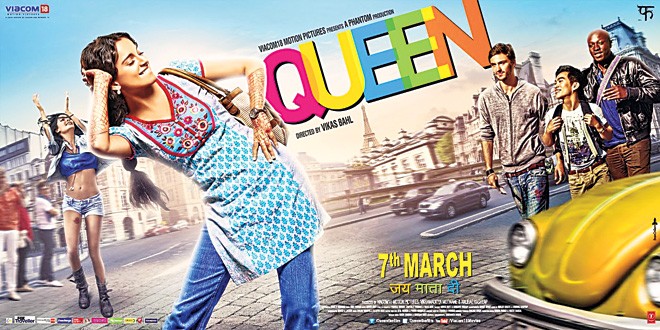

Even Carrie Bradshaw of Sex and the City honeymooning with her besties post her last-minute split was quite a break from the conventional indulgent breakup melodrama even for the Western audience. But what Queen does, even for a foreign audience let alone the traditional Bollywood palate, is iconoclastic – it sends its heroine, a paragon of naiveté, out on her honeymoon, or whatever remains of it, all alone.
Queen inarguably breaks out of the orthodox paradigm of a Hindi masala movie centered around a couple’s cumbersome journey from falling in love to tying the knot. On the contrary, it gives you one clean shot at a girl’s journey of self-discovery and enlightenment.
And Kangana Ranaut! Look at the wide-ranging radius of her performance, from a brazen top model in Fashion to a glamorous mutant in Krrish 3 to a docile, desi Delhi girl struggling with her abrupt breakup and evolving sense of self.
And it’s not just Kangana who consummately fits her role; it’s everyone and everything that makes perfect sense to contrive the entire scenario. The Daddyji, Mummy ji, Chintu (the brother) and the Dadiji all blend in so well together in a brilliant brewing in a middle-class family histrionics. The opening gidha-sidha rasm with effervescent dance number London Thumakda projects as an immaculate start to what may ironically turn not-so-perfect for Indian audience.
Rani’s inaugural thoughts near her wedding have almost nothing to do with the wedding itself and thus right in the beginning show the painful cultural irony attached to weddings in our part of culture. And it’s not just this that’s mocked at in the film; it’s also how a woman is infinitely encumbered in our society. It’s funny how Rani’s chubby younger brother’s presence is a more or less an essential ingredient in her meetings with Vijay. His not-so-funny jokes Rani so foolishly laughs at in the name of her good sense of humor and her parent’s forcing her to take him everywhere; "chotu ko saath le jao na" shows an epic cultural marker where a brother, younger or elder, acts as a guardian for a sister regardless how old she is.
The only time her parents really let her be on her own is when the ideal marriage setup falls apart, leaving nothing for them to hold back Rani from going on her self-proclaimed honeymoon as a desperate attempt to escape the sympathies of her relatives for her fallen fate.
Rani knows nothing about operating anywhere other than the streets of Rajouri, Dehli. And landing in Paris in her crisp, resplendent kurti with a dull sweater hung over her shoulder, her first encounter is with Vijayalakshmi, the hot hotel maid with high libido and a totally "hip" view of life. Lisa Haydon, with perfect babe-quotient, is a stray away from every ideal Rani’s ever been fed with.
The stark difference in the mindset and lifestyle between the two girls is very telling of a gulf of cultural gap and hence the behavioral stereotypes. But can we idealize her as opposed to Rani? Not really. But the film doesn’t mean you to. It only highlights the two extremes of one gender by juxtaposing them together and making them come to an amicable meeting point. One of the few truly ironic derision over Indian culture is when Kangana says, "You taste your burp? We are not even allowed to burp. I’ve never burped". Another sassy look at the culture is when Rani visits Pammi aunty and listens to her and her mother’s artificial display of mocking pity and sympathy beating her chest in pain. So our culture! Rings any bell?
Curiously, Rani seems pretty disposed towards accepting a new culture not because she’s naïve but because whatever she was taught so far and all she’s been didn’t really work for her in the end. What truly leads Rani to question her ideals and break the shackles of tradition and so-called morality? Perhaps, this dialogue should explain this best, "Mera haal na Gupta uncle ke jaise ho gaya hai. Gupta uncle ko na cancer ho gaya hai. Unho ne kabhi sharab nai pi, cigarette nai pi, phir bhi cancer ho gaya. Is se accha toh pi lete."
Following next is director’s eccentric formula of evolution for Rani. A few jhatkas in the bar and booze to loosen up, sharing room with three guys – a vertically challenged Japanese, a black Frenchman, and a Spanish guy who loved painting, and outselling others at a gol gappa stall just does it all.
At a few places, the film does lose its foothold especially with unnecessary stretch of time, and when Vijay comes running to Paris after Rani begging to have him back for reasons completely unknown.
The end is superb though. Rani sets herself free from the tangles of tradition and wedding woes walking past as a solid, spirited and independent person in a new modern look. Well, they say change comes with a new look and if we don’t hold this as a point for debate against the movie, we could easily rate Queen as a must-watch for all men and women alike. And I’m not the only one who thinks this, Amir Khan thinks so too,
Tweet: "Such an important film for every girl, every woman to watch… and in fact every male to watch too!"
*CINEMATIC SUICIDE
**FORGETTABLE
***WATCHABLE
****COLLECTIBLE
*****AWARD-WORTHY